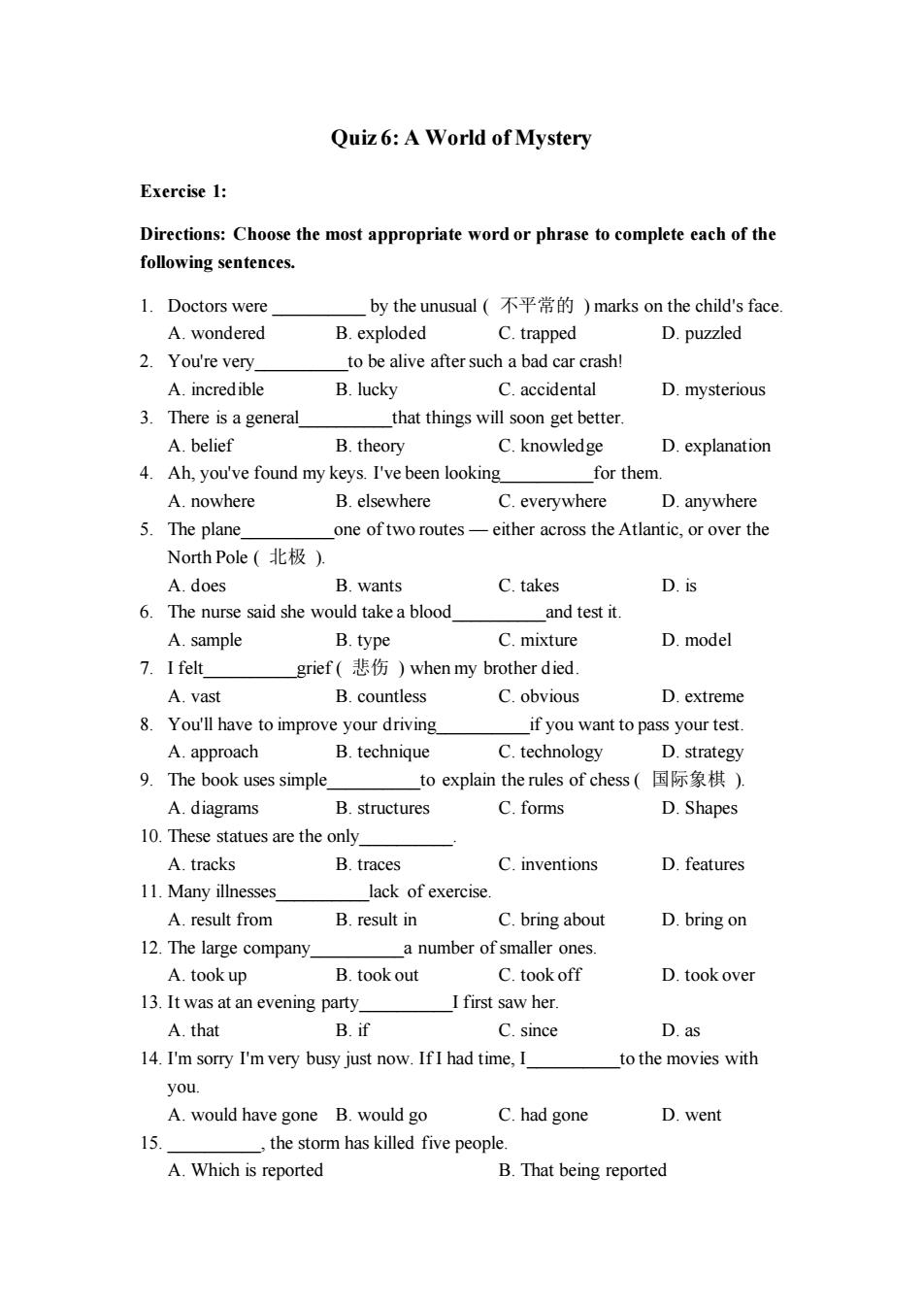
Quiz 6:A World of Mystery Exercise 1: Directions:Choose the most appropriate word or phrase to complete each of the following sentences. 1.Doctors were by the unusual(不平常的)marks on the child's face A.wondered B.exploded C.trapped D.puzzled 2.You're very to be alive after such a bad car crash! A.incredible B.lucky C.accidental D.mysterious 3.There is a general that things will soon get better A.belief B.theory C.knowledge D.explanation 4.Ah,you've found my keys.I've been looking for them. A.nowhere B.elsewhere C.everywhere D.anywhere 5.The plane one of two routes-either across the Atlantic.or over the North Pole(北极). A.does B.wants C.takes D.is 6.The nurse said she would take a blood and test it A.sample B.type C.mixture D.model 7.I felt grief(悲伤)when my brother died A.vast B.countless C.obvious D.extreme 8.You'll have to improve your driving if you want to pass your test. A.approach B.technique C.technology D.strategy 9.The book uses simple to explain the rules of chess(国际象棋) A.diagrams B.structures C.forms D.Shapes 10.These statues are the only A.tracks B.traces C.inventions D.features 11.Many illnesses lack of exercise. A.result from B.result in C.bring about D.bring on 12.The large company a number of smaller ones. A.took up B.took out C.took off D.took over 13.It was at an evening party. I first saw her. A.that B.if C.since D.as 14.I'm sorry I'm very busy just now.If I had time,I to the movies with you. A.would have gone B.would go C.had gone D.went 15. the storm has killed five people. A.Which is reported B.That being reported
Quiz 6: A World of Mystery Exercise 1: Directions: Choose the most appropriate word or phrase to complete each of the following sentences. 1. Doctors were __________ by the unusual ( 不平常的 ) marks on the child's face. A. wondered B. exploded C. trapped D. puzzled 2. You're very__________to be alive after such a bad car crash! A. incredible B. lucky C. accidental D. mysterious 3. There is a general__________that things will soon get better. A. belief B. theory C. knowledge D. explanation 4. Ah, you've found my keys. I've been looking__________for them. A. nowhere B. elsewhere C. everywhere D. anywhere 5. The plane__________one of two routes — either across the Atlantic, or over the North Pole ( 北极 ). A. does B. wants C. takes D. is 6. The nurse said she would take a blood__________and test it. A. sample B. type C. mixture D. model 7. I felt__________grief ( 悲伤 ) when my brother died. A. vast B. countless C. obvious D. extreme 8. You'll have to improve your driving__________if you want to pass your test. A. approach B. technique C. technology D. strategy 9. The book uses simple__________to explain the rules of chess ( 国际象棋 ). A. diagrams B. structures C. forms D. Shapes 10. These statues are the only__________. A. tracks B. traces C. inventions D. features 11. Many illnesses__________lack of exercise. A. result from B. result in C. bring about D. bring on 12. The large company__________a number of smaller ones. A. took up B. took out C. took off D. took over 13. It was at an evening party__________I first saw her. A. that B. if C. since D. as 14. I'm sorry I'm very busy just now. If I had time, I__________to the movies with you. A. would have gone B. would go C. had gone D. went 15. __________, the storm has killed five people. A. Which is reported B. That being reported
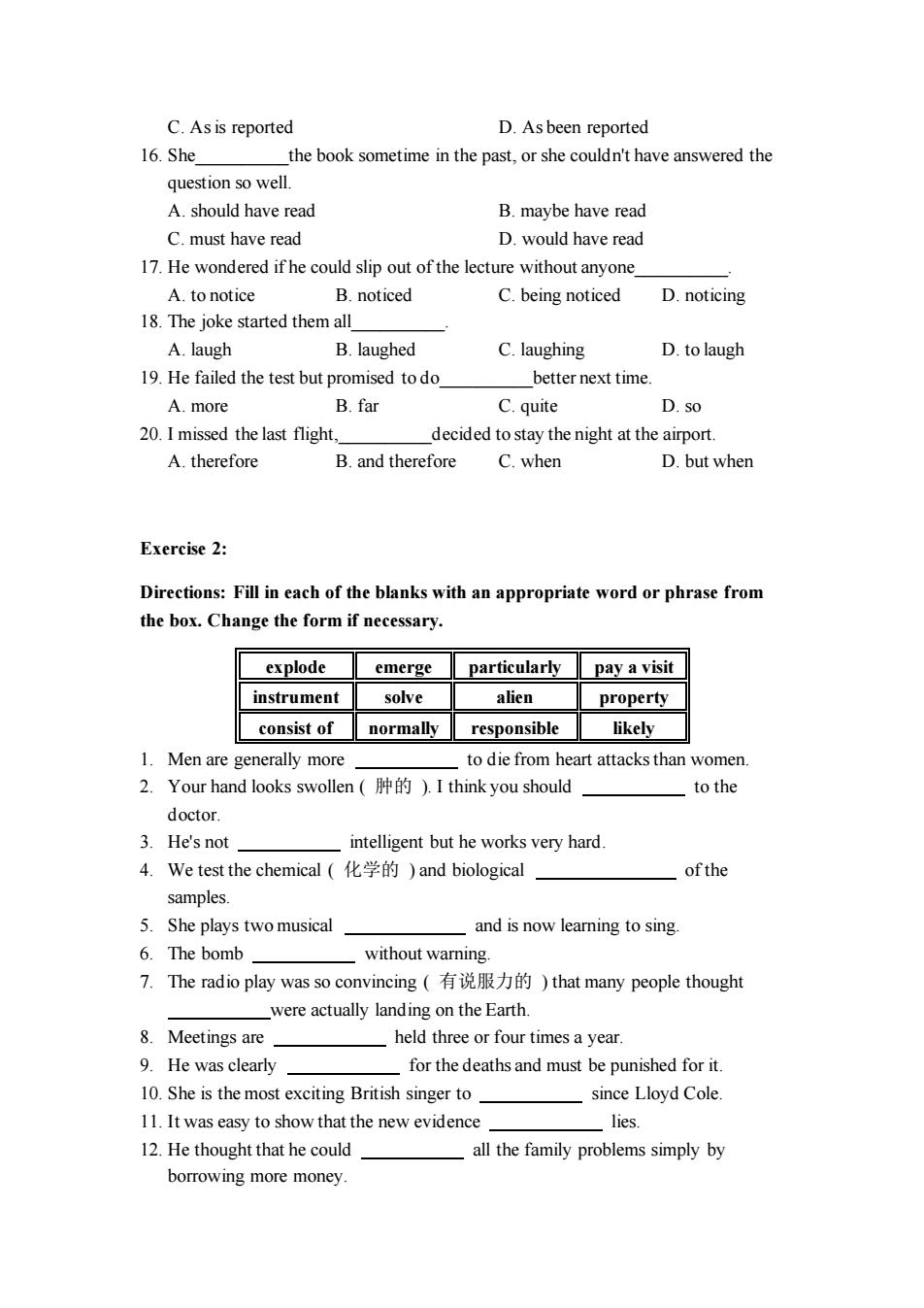
C.As is reported D.As been reported 16.She the book sometime in the past,or she couldn't have answered the question so well. A.should have read B.maybe have read C.must have read D.would have read 17.He wondered if he could slip out of the lecture without anyone A.to notice B.noticed C.being noticed D.noticing 18.The joke started them all A.laugh B.laughed C.laughing D.to laugh 19.He failed the test but promised to do better next time. A.more B.far C.quite D.so 20.I missed the last flight, decided to stay the night at the airport. A.therefore B.and therefore C.when D.but when Exercise 2: Directions:Fill in each of the blanks with an appropriate word or phrase from the box.Change the form if necessary. explode emerge particularly pay a visit instrument solve alien property consist of normally responsible likely 1.Men are generally more to die from heart attacks than women 2.Your hand looks swollen )I think you should to the doctor. 3.He's not intelligent but he works very hard 4.We test the chemical(化学的)and biological ofthe samples. 5.She plays two musical and is now learning to sing. 6.The bomb without warning. 7.The radio play was so convincing(有说服力的)that many people thought were actually landing on the Earth 8.Meetings are held three or four times a year. 9.He was clearly for the deaths and must be punished for it 10.She is the most exciting British singer to_ since Lloyd Cole 11.It was easy to show that the new evidence lies. 12.He thought that he could all the family problems simply by borrowing more money
C. As is reported D. As been reported 16. She__________the book sometime in the past, or she couldn't have answered the question so well. A. should have read B. maybe have read C. must have read D. would have read 17. He wondered if he could slip out of the lecture without anyone__________. A. to notice B. noticed C. being noticed D. noticing 18. The joke started them all__________. A. laugh B. laughed C. laughing D. to laugh 19. He failed the test but promised to do__________better next time. A. more B. far C. quite D. so 20. I missed the last flight,__________decided to stay the night at the airport. A. therefore B. and therefore C. when D. but when Exercise 2: Directions: Fill in each of the blanks with an appropriate word or phrase from the box. Change the form if necessary. explode emerge particularly pay a visit instrument solve alien property consist of normally responsible likely 1. Men are generally more to die from heart attacks than women. 2. Your hand looks swollen ( 肿的 ). I think you should to the doctor. 3. He's not intelligent but he works very hard. 4. We test the chemical ( 化学的 ) and biological of the samples. 5. She plays two musical and is now learning to sing. 6. The bomb without warning. 7. The radio play was so convincing ( 有说服力的 ) that many people thought were actually landing on the Earth. 8. Meetings are held three or four times a year. 9. He was clearly for the deaths and must be punished for it. 10. She is the most exciting British singer to since Lloyd Cole. 11. It was easy to show that the new evidence lies. 12. He thought that he could all the family problems simply by borrowing more money
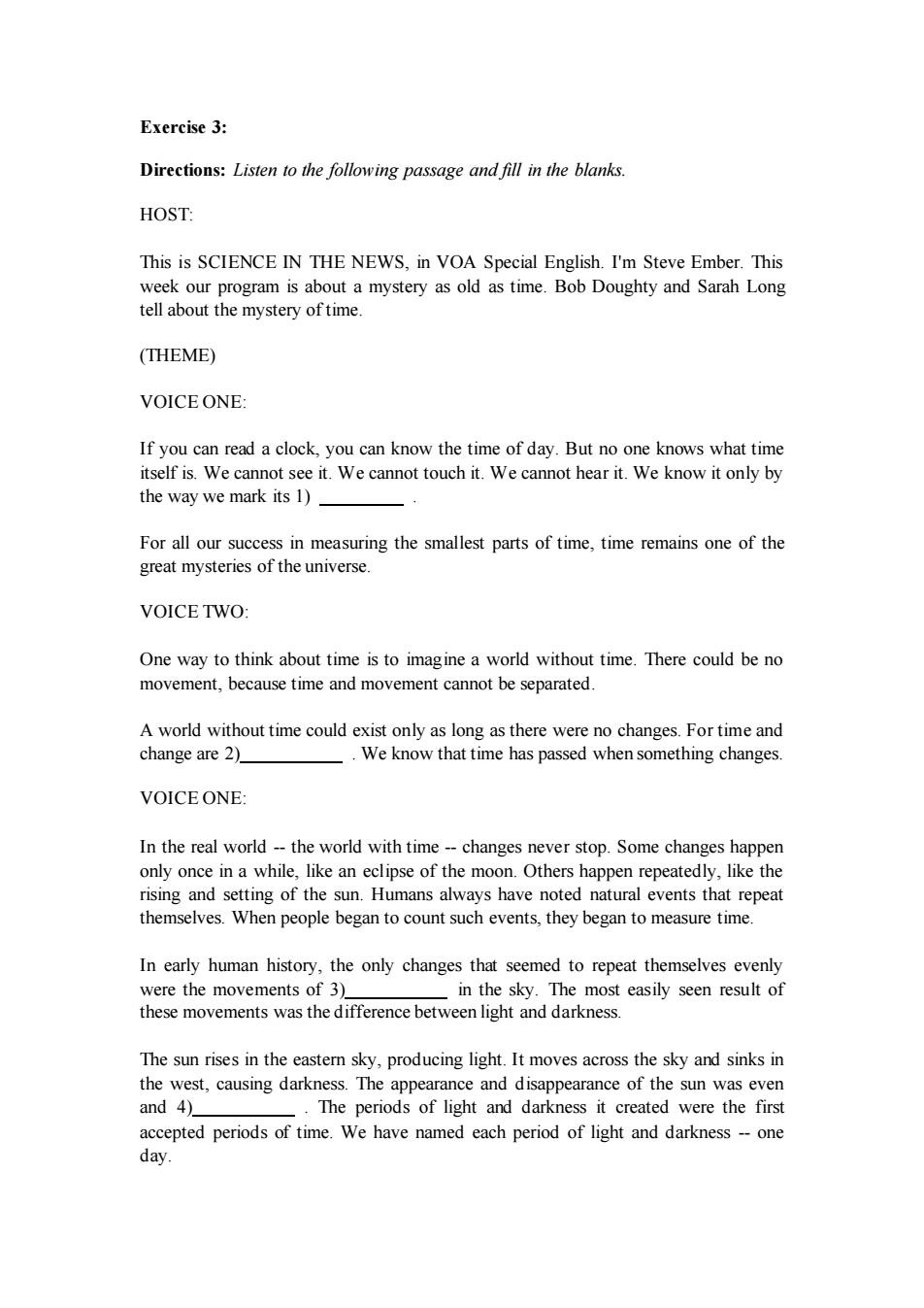
Exercise 3: Directions:Listen to the following passage and fill in the blanks. HOST: This is SCIENCE IN THE NEWS,in VOA Special English.I'm Steve Ember.This week our program is about a mystery as old as time.Bob Doughty and Sarah Long tell about the mystery of time. (THEME) VOICE ONE: If you can read a clock,you can know the time of day.But no one knows what time itself is.We cannot see it.We cannot touch it.We cannot hear it.We know it only by the way we mark its 1) For all our success in measuring the smallest parts of time,time remains one of the great mysteries of the universe. VOICE TWO: One way to think about time is to imagine a world without time.There could be no movement,because time and movement cannot be separated. A world without time could exist only as long as there were no changes.For time and change are 2) _We know that time has passed when something changes. VOICE ONE: In the real world--the world with time--changes never stop.Some changes happen only once in a while,like an eclipse of the moon.Others happen repeatedly,like the rising and setting of the sun.Humans always have noted natural events that repeat themselves.When people began to count such events,they began to measure time. In early human history,the only changes that seemed to repeat themselves evenly were the movements of 3) in the sky.The most easily seen result of these movements was the difference between light and darkness. The sun rises in the eastern sky,producing light.It moves across the sky and sinks in the west,causing darkness.The appearance and disappearance of the sun was even and 4) _The periods of light and darkness it created were the first accepted periods of time.We have named each period of light and darkness --one day
Exercise 3: Directions: Listen to the following passage and fill in the blanks. HOST: This is SCIENCE IN THE NEWS, in VOA Special English. I'm Steve Ember. This week our program is about a mystery as old as time. Bob Doughty and Sarah Long tell about the mystery of time. (THEME) VOICE ONE: If you can read a clock, you can know the time of day. But no one knows what time itself is. We cannot see it. We cannot touch it. We cannot hear it. We know it only by the way we mark its 1) . For all our success in measuring the smallest parts of time, time remains one of the great mysteries of the universe. VOICE TWO: One way to think about time is to imagine a world without time. There could be no movement, because time and movement cannot be separated. A world without time could exist only as long as there were no changes. For time and change are 2) . We know that time has passed when something changes. VOICE ONE: In the real world -- the world with time -- changes never stop. Some changes happen only once in a while, like an eclipse of the moon. Others happen repeatedly, like the rising and setting of the sun. Humans always have noted natural events that repeat themselves. When people began to count such events, they began to measure time. In early human history, the only changes that seemed to repeat themselves evenly were the movements of 3) in the sky. The most easily seen result of these movements was the difference between light and darkness. The sun rises in the eastern sky, producing light. It moves across the sky and sinks in the west, causing darkness. The appearance and disappearance of the sun was even and 4) . The periods of light and darkness it created were the first accepted periods of time. We have named each period of light and darkness -- one day
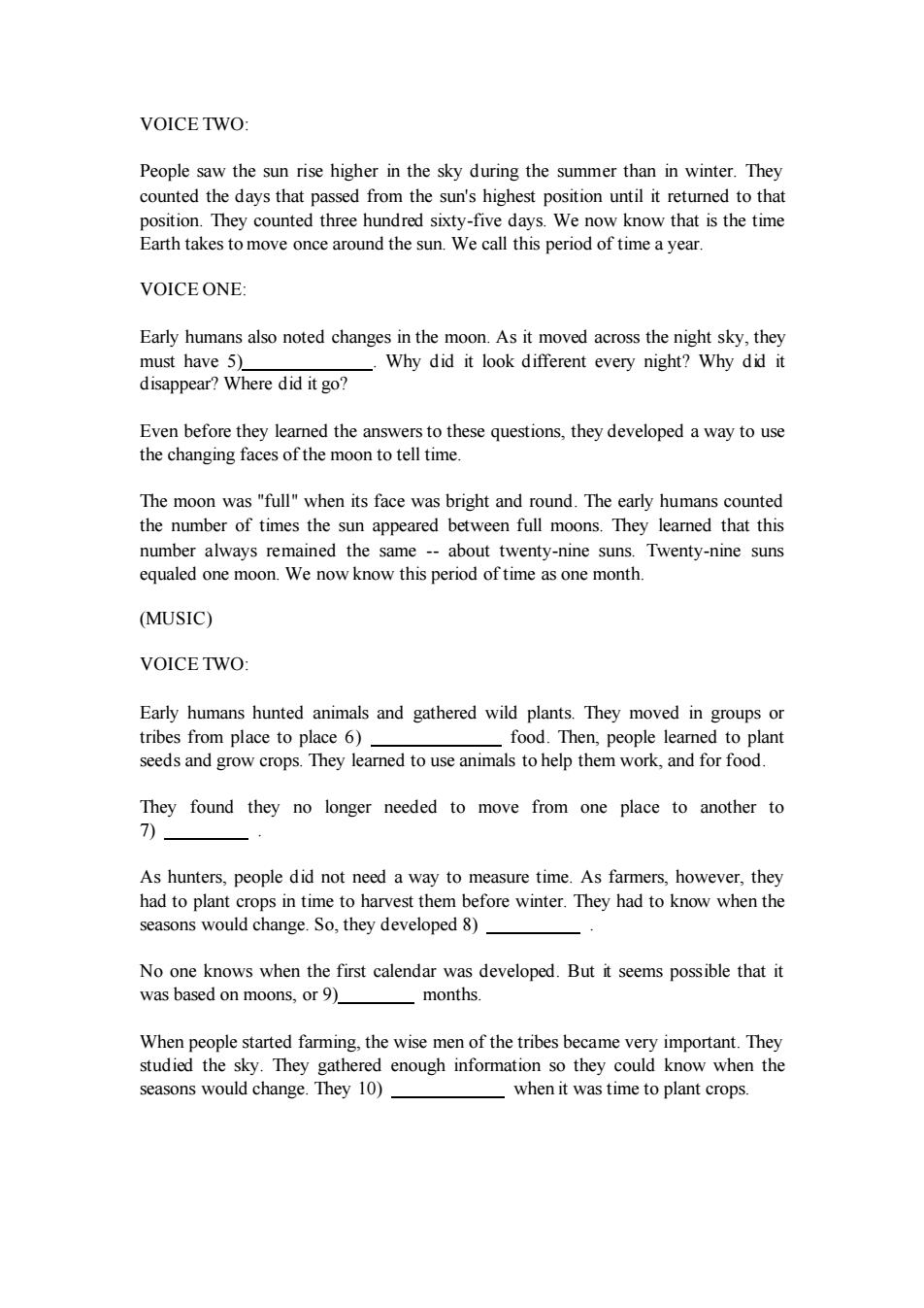
VOICE TWO: People saw the sun rise higher in the sky during the summer than in winter.They counted the days that passed from the sun's highest position until it returned to that position.They counted three hundred sixty-five days.We now know that is the time Earth takes to move once around the sun.We call this period of time a year. VOICE ONE: Early humans also noted changes in the moon.As it moved across the night sky,they must have 5) _Why did it look different every night?Why did it disappear?Where did it go? Even before they learned the answers to these questions,they developed a way to use the changing faces of the moon to tell time. The moon was "full"when its face was bright and round.The early humans counted the number of times the sun appeared between full moons.They learned that this number always remained the same --about twenty-nine suns.Twenty-nine suns equaled one moon.We now know this period of time as one month. (MUSIC) VOICE TWO: Early humans hunted animals and gathered wild plants.They moved in groups or tribes from place to place 6) food.Then,people learned to plant seeds and grow crops.They learned to use animals to help them work,and for food. They found they no longer needed to move from one place to another to 7) As hunters,people did not need a way to measure time.As farmers,however,they had to plant crops in time to harvest them before winter.They had to know when the seasons would change.So,they developed 8) No one knows when the first calendar was developed.But it seems possible that it was based on moons,or 9)months. When people started farming,the wise men of the tribes became very important.They studied the sky.They gathered enough information so they could know when the seasons would change.They 10)_ when it was time to plant crops
VOICE TWO: People saw the sun rise higher in the sky during the summer than in winter. They counted the days that passed from the sun's highest position until it returned to that position. They counted three hundred sixty-five days. We now know that is the time Earth takes to move once around the sun. We call this period of time a year. VOICE ONE: Early humans also noted changes in the moon. As it moved across the night sky, they must have 5) . Why did it look different every night? Why did it disappear? Where did it go? Even before they learned the answers to these questions, they developed a way to use the changing faces of the moon to tell time. The moon was "full" when its face was bright and round. The early humans counted the number of times the sun appeared between full moons. They learned that this number always remained the same -- about twenty-nine suns. Twenty-nine suns equaled one moon. We now know this period of time as one month. (MUSIC) VOICE TWO: Early humans hunted animals and gathered wild plants. They moved in groups or tribes from place to place 6) food. Then, people learned to plant seeds and grow crops. They learned to use animals to help them work, and for food. They found they no longer needed to move from one place to another to 7) . As hunters, people did not need a way to measure time. As farmers, however, they had to plant crops in time to harvest them before winter. They had to know when the seasons would change. So, they developed 8) . No one knows when the first calendar was developed. But it seems possible that it was based on moons, or 9) months. When people started farming, the wise men of the tribes became very important. They studied the sky. They gathered enough information so they could know when the seasons would change. They 10) when it was time to plant crops
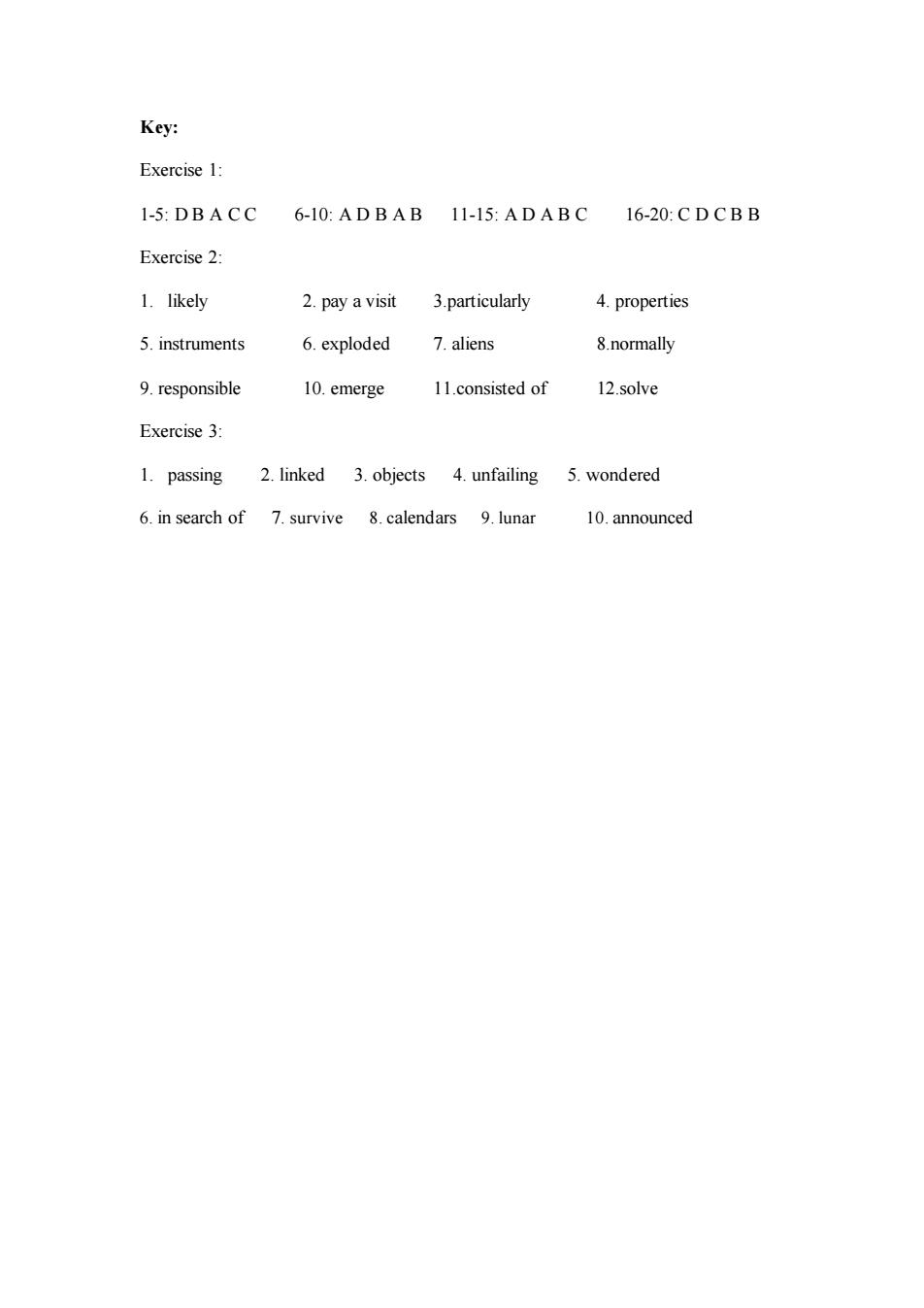
Key: Exercise 1: 1-5:DBACC 6-10:ADBAB 11-15:ADABC 16-20:CD CB B Exercise 2: 1.likely 2.pay a visit 3.particularly 4.properties 5.instruments 6.exploded 7.aliens 8.normally 9.responsible 10.emerge 11.consisted of 12.solve Exercise 3: 1.passing 2.linked 3.objects 4.unfailing 5.wondered 6.in search of 7.survive 8.calendars 9.lunar 10.announced
Key: Exercise 1: 1-5: D B A C C 6-10: A D B A B 11-15: A D A B C 16-20: C D C B B Exercise 2: 1. likely 2. pay a visit 3.particularly 4. properties 5. instruments 6. exploded 7. aliens 8.normally 9. responsible 10. emerge 11.consisted of 12.solve Exercise 3: 1. passing 2. linked 3. objects 4. unfailing 5. wondered 6. in search of 7. survive 8. calendars 9. lunar 10. announced